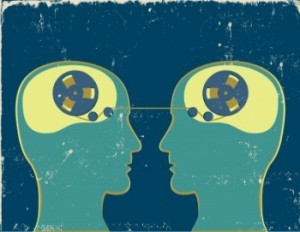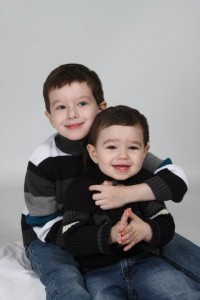I know, my mom was the only mom to ever use that expression, right? No?
I think it’s one of, if not the, first lesson most of us can remember having learned… because right around the time we start retaining memories for later is about the same time that we learn to just say what ever is on our mind.
Before kids learn to lie, they learn to be honest… brutally honest. If your ass looks fat in those jeans, your little one will tell you about it.
I bet my mom never imagined it would be like this
So now I’m a grown up, I have children of my own and I get to sling the old cliché’d lessons around too… but it’s not the same for me. As the parent of an autistic child, I have a better chance of teaching this lesson to my 3 year old than I do my 6 year old son with Autism.
Autism is classified as a social impairment and a lack of fundamental understandings in communication… more to the point, autistics have a hard time maintaining friendships, relationships and even simple conversations.
One of the reasons for this is that people in society aren’t very good at accepting brutal honesty. To most people, an insult is an insult… whether it’s true or not. If you call an ugly person ugly… you’re insulting them.
Why? Because of generations and generations of people saying “If you can’t say something nice, don’t say anything at all.” Would we still take offense to brutal honesty if people didn’t say that? Probably. Still though, when you think about it… it’s actually rather silly.
Essentially people have become so insecure that hearing a negative, even when true, is an insult. And so we teach people not to say anything unless they have something nice to say.
Autism – “don’t say anything at all”
Now I’m presented with two problems that my own mother never had to deal with…
- People, especially children, with Autism are already less likely to say anything at all. Either from being non-verbal to begin with or being socially unable, either via anxiety or fear or what have you. So telling an autistic child not to say anything at all becomes very counter productive.
- People, again, especially children, with Autism are very much inclined to say what they believe to be true, whether nice or not. Lacking social aptitude as well as having a lack of understanding how and what other people think, they don’t tend to take into consideration how what they say will affect others.
So not only does this expression discourage my son from speaking but it also puts a very heavy weight on him as he will either never know, or never know with any certainty, if what he is about to say is something nice or not.
First, I encourage him to tell the truth and not lie… then I have to tell him not to tell the truth when it’s not nice. This is a lot for any child to deal with, so how well is it going to be taken by a child that is unable to comprehend what others may or may not be thinking.
What to do?
 Well, I can’t really go around society convincing people to just be more secure with themselves and accept a little honest criticism sometimes… I’m pretty sure even I can’t live up to that expectation all the time…. although it is a nice thought.
Well, I can’t really go around society convincing people to just be more secure with themselves and accept a little honest criticism sometimes… I’m pretty sure even I can’t live up to that expectation all the time…. although it is a nice thought.
Do I tell my son the same old cliché in hopes that he can figure it out and make the most of it? Do I hope that it doesn’t only complicate matters for him?
Ultimately, this comes down to the age old debate that sometimes still causes arguments among parents of autistic children… do I help my child to conform and be a part of society or do I allow him to be his own person, which in all likelihood will make him a better person but also cause a lot of problems for him down the road?
The problem is, there is no one right or wrong answer and certainly not an easy one.
The best that I can do, for me, I think, is to convey the message but abandon the cliché. It’s true, I need for him to understand when to speak up and when not to, to consider the thoughts and feelings of others but it’s also true that I can’t put the same kinds of expectations on him that my mother put on me.
In other words, I can’t just cliché him to death and expect him to get it.
In the television show Parenthood, Max (child with Autism) tells a former alcoholic that he shouldn’t go to a party because he’s an alcoholic… Max’s sister is quick to respond, as though Max shouldn’t be rude, but the former alcoholic says “it’s ok, he’s just looking out for me. I should be as honest with myself as he is.” and realizes that Max is right.
A part of me never wants to squash that in my son. There’s something there to be admired.
It’s a delicate balance I think… not an all or nothing system. Which just makes it all that much more difficult. I don’t want my son to never speak up for fear of not being nice but I also don’t want him unintentionally offending everyone he meets.
Unfortunately, you won’t get any solid answers from me on this one… this is a life long lesson that even the best of us sometimes still wrong.
Like many things, this is going to be a process… one that will hopefully help him to understand society and his place in it as well as to help me learn some new things along the way as well.













